FY021: Case Study on Employee Motivation at Tesco Jack Stores
VerifiedAdded on 2023/01/12
|7
|1352
|54
Case Study
AI Summary
This case study analyzes motivational techniques that Tesco can implement at its new Jack Discount Stores to enhance employee productivity and satisfaction. The study focuses on two key motivational theories: Maslow's Need Hierarchy Theory and Vroom's Expectancy Theory. It explores how Tesco's management can apply Maslow's theory by addressing employees' physiological, safety, belongingness, esteem, and self-actualization needs to foster a positive work environment. Furthermore, the case study examines Vroom's Expectancy Theory, emphasizing the importance of valence, expectancy, and instrumentality in motivating employees through rewards and incentives. The analysis provides justifications, advantages, and disadvantages of each theory, offering practical insights for Tesco's management to improve employee motivation, morale, and overall business performance within the competitive discount store market.
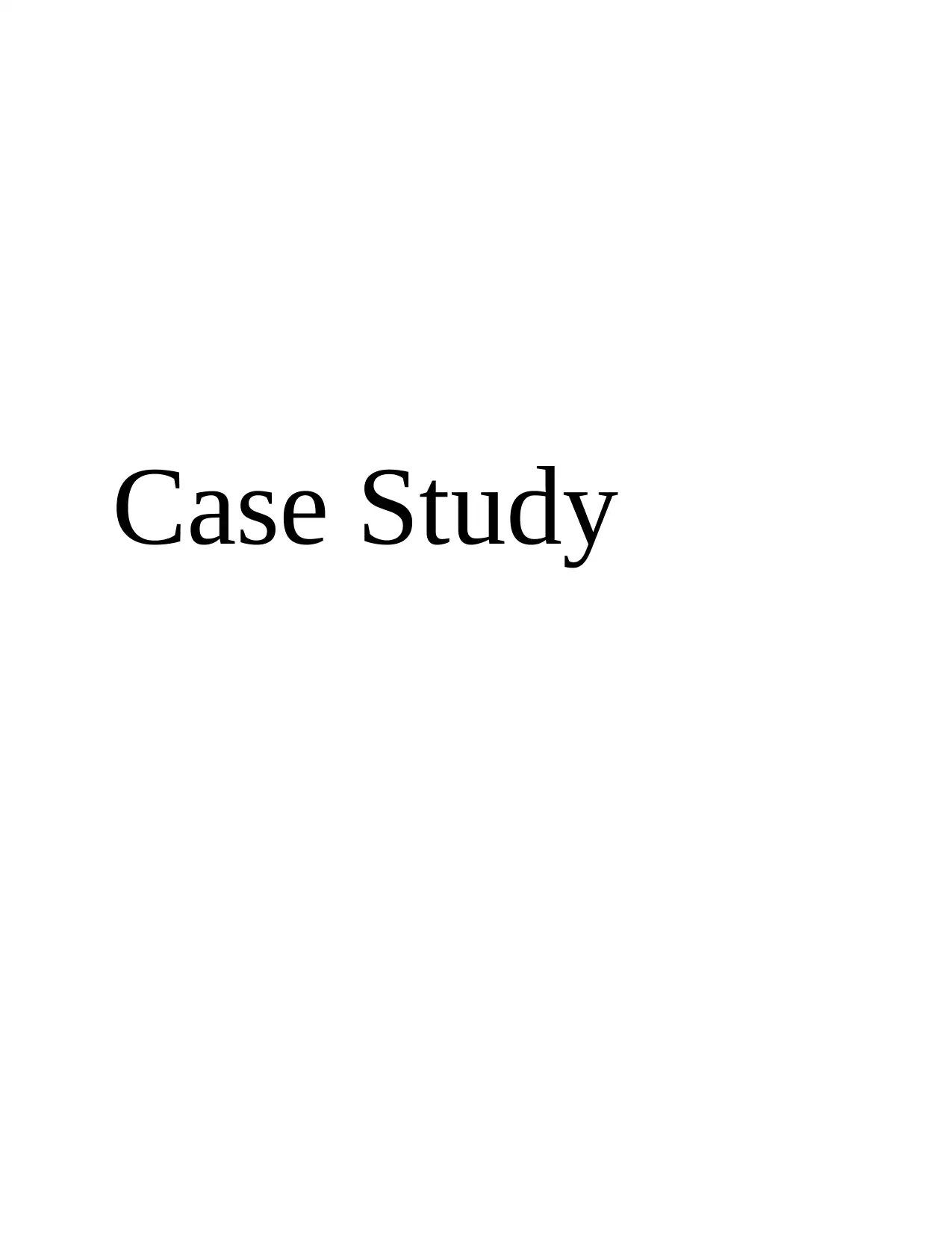
Case Study
Paraphrase This Document
Need a fresh take? Get an instant paraphrase of this document with our AI Paraphraser
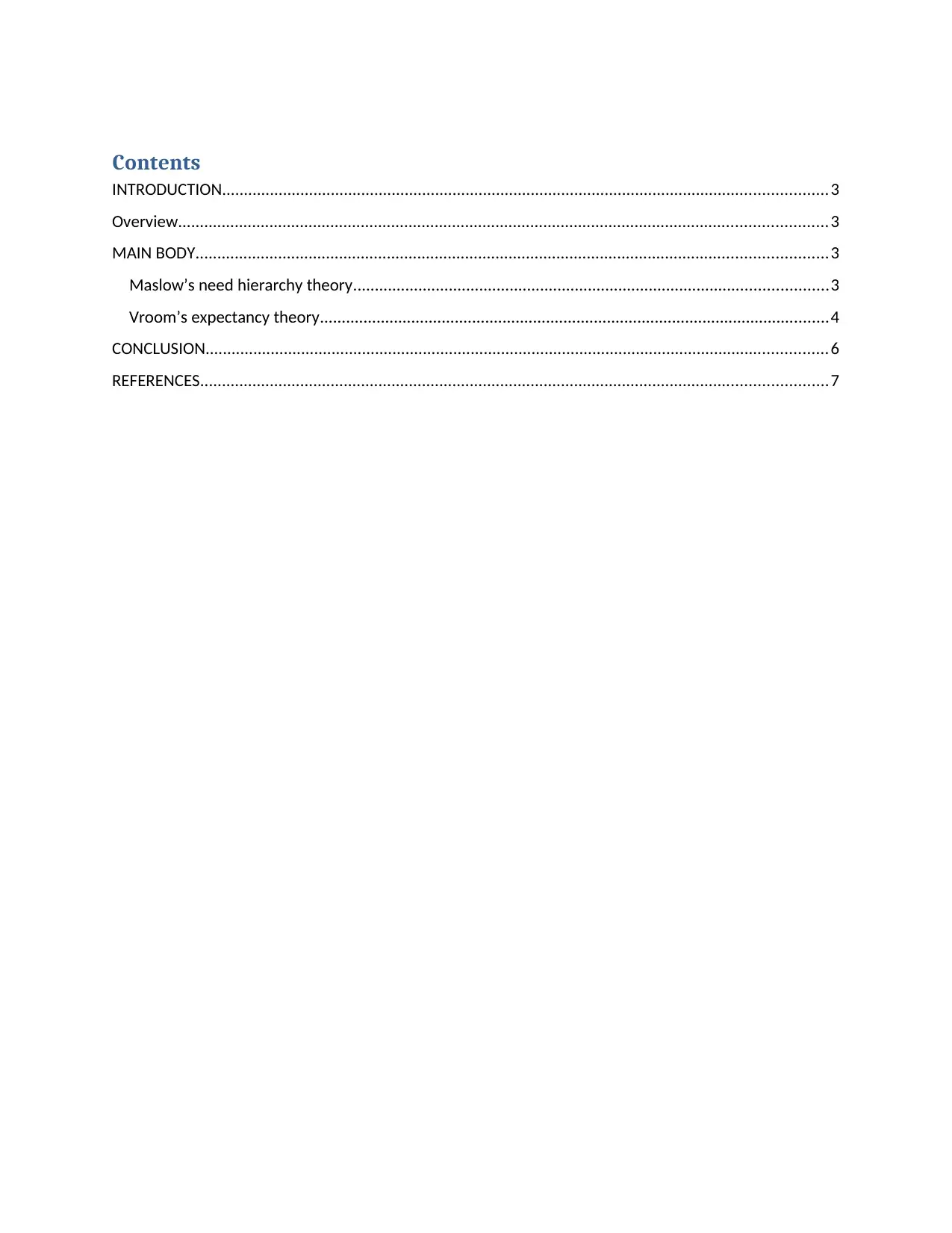
Contents
INTRODUCTION...........................................................................................................................................3
Overview.....................................................................................................................................................3
MAIN BODY.................................................................................................................................................3
Maslow’s need hierarchy theory.............................................................................................................3
Vroom’s expectancy theory.....................................................................................................................4
CONCLUSION...............................................................................................................................................6
REFERENCES................................................................................................................................................7
INTRODUCTION...........................................................................................................................................3
Overview.....................................................................................................................................................3
MAIN BODY.................................................................................................................................................3
Maslow’s need hierarchy theory.............................................................................................................3
Vroom’s expectancy theory.....................................................................................................................4
CONCLUSION...............................................................................................................................................6
REFERENCES................................................................................................................................................7
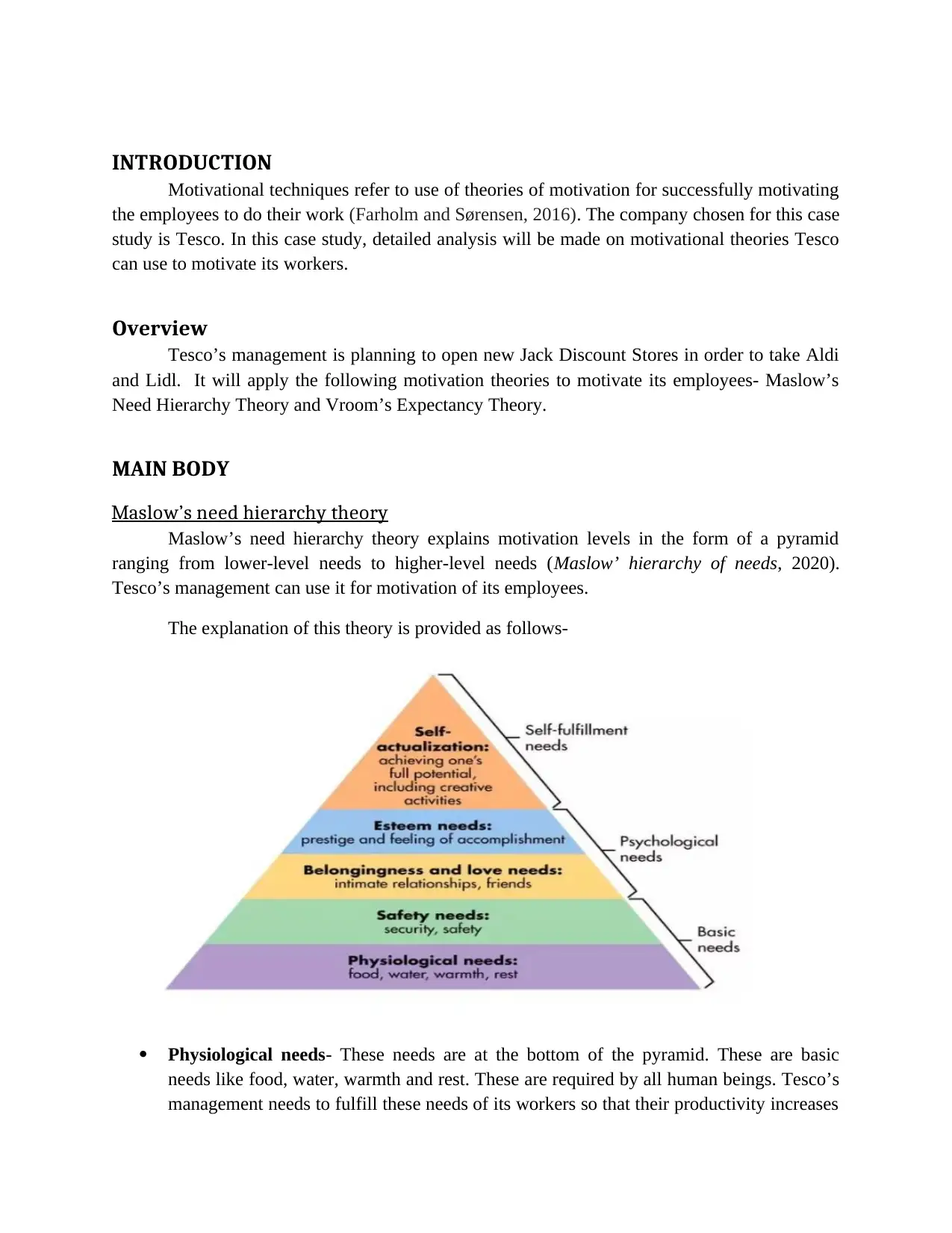
INTRODUCTION
Motivational techniques refer to use of theories of motivation for successfully motivating
the employees to do their work (Farholm and Sørensen, 2016). The company chosen for this case
study is Tesco. In this case study, detailed analysis will be made on motivational theories Tesco
can use to motivate its workers.
Overview
Tesco’s management is planning to open new Jack Discount Stores in order to take Aldi
and Lidl. It will apply the following motivation theories to motivate its employees- Maslow’s
Need Hierarchy Theory and Vroom’s Expectancy Theory.
MAIN BODY
Maslow’s need hierarchy theory
Maslow’s need hierarchy theory explains motivation levels in the form of a pyramid
ranging from lower-level needs to higher-level needs (Maslow’ hierarchy of needs, 2020).
Tesco’s management can use it for motivation of its employees.
The explanation of this theory is provided as follows-
Physiological needs- These needs are at the bottom of the pyramid. These are basic
needs like food, water, warmth and rest. These are required by all human beings. Tesco’s
management needs to fulfill these needs of its workers so that their productivity increases
Motivational techniques refer to use of theories of motivation for successfully motivating
the employees to do their work (Farholm and Sørensen, 2016). The company chosen for this case
study is Tesco. In this case study, detailed analysis will be made on motivational theories Tesco
can use to motivate its workers.
Overview
Tesco’s management is planning to open new Jack Discount Stores in order to take Aldi
and Lidl. It will apply the following motivation theories to motivate its employees- Maslow’s
Need Hierarchy Theory and Vroom’s Expectancy Theory.
MAIN BODY
Maslow’s need hierarchy theory
Maslow’s need hierarchy theory explains motivation levels in the form of a pyramid
ranging from lower-level needs to higher-level needs (Maslow’ hierarchy of needs, 2020).
Tesco’s management can use it for motivation of its employees.
The explanation of this theory is provided as follows-
Physiological needs- These needs are at the bottom of the pyramid. These are basic
needs like food, water, warmth and rest. These are required by all human beings. Tesco’s
management needs to fulfill these needs of its workers so that their productivity increases
⊘ This is a preview!⊘
Do you want full access?
Subscribe today to unlock all pages.

Trusted by 1+ million students worldwide
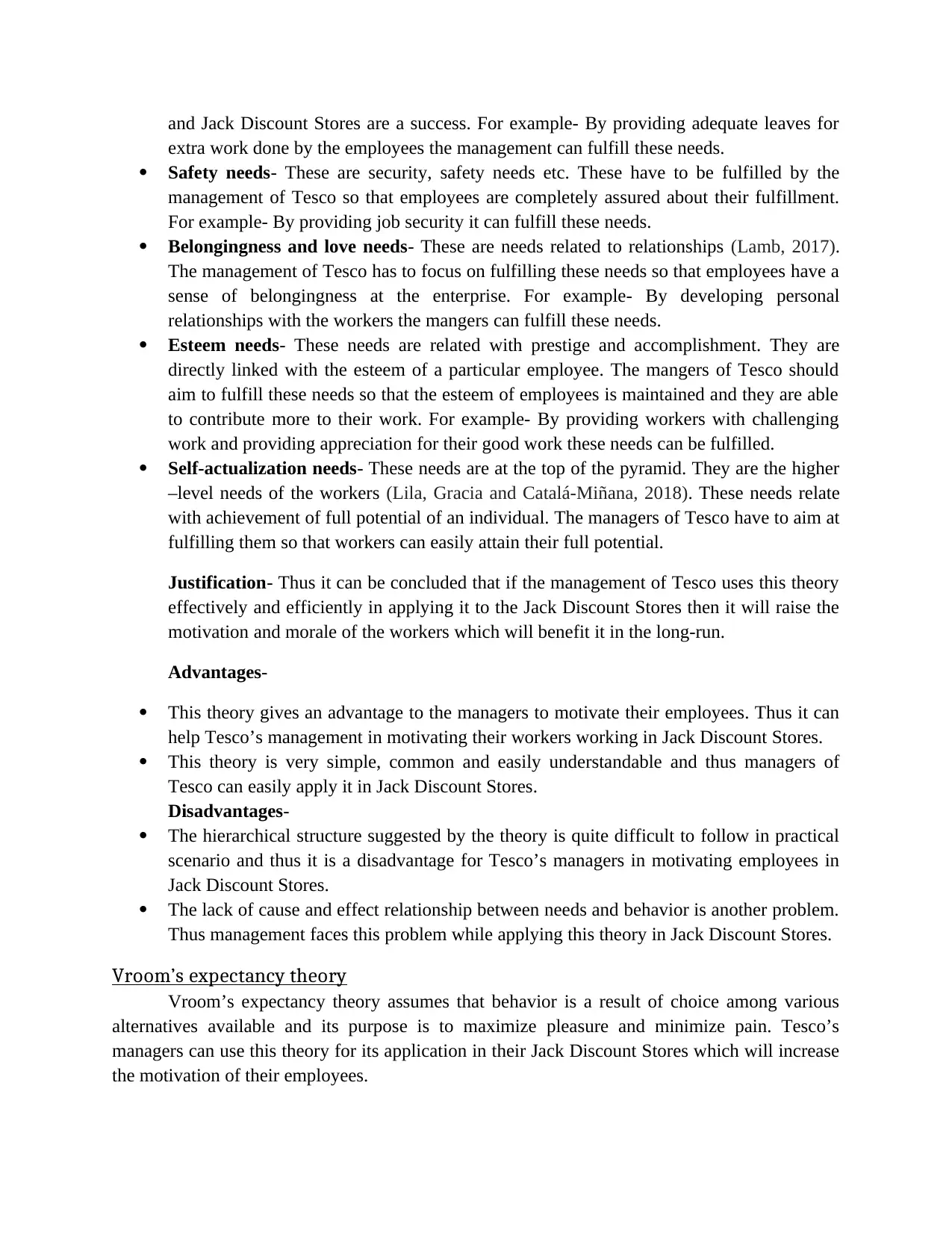
and Jack Discount Stores are a success. For example- By providing adequate leaves for
extra work done by the employees the management can fulfill these needs.
Safety needs- These are security, safety needs etc. These have to be fulfilled by the
management of Tesco so that employees are completely assured about their fulfillment.
For example- By providing job security it can fulfill these needs.
Belongingness and love needs- These are needs related to relationships (Lamb, 2017).
The management of Tesco has to focus on fulfilling these needs so that employees have a
sense of belongingness at the enterprise. For example- By developing personal
relationships with the workers the mangers can fulfill these needs.
Esteem needs- These needs are related with prestige and accomplishment. They are
directly linked with the esteem of a particular employee. The mangers of Tesco should
aim to fulfill these needs so that the esteem of employees is maintained and they are able
to contribute more to their work. For example- By providing workers with challenging
work and providing appreciation for their good work these needs can be fulfilled.
Self-actualization needs- These needs are at the top of the pyramid. They are the higher
–level needs of the workers (Lila, Gracia and Catalá-Miñana, 2018). These needs relate
with achievement of full potential of an individual. The managers of Tesco have to aim at
fulfilling them so that workers can easily attain their full potential.
Justification- Thus it can be concluded that if the management of Tesco uses this theory
effectively and efficiently in applying it to the Jack Discount Stores then it will raise the
motivation and morale of the workers which will benefit it in the long-run.
Advantages-
This theory gives an advantage to the managers to motivate their employees. Thus it can
help Tesco’s management in motivating their workers working in Jack Discount Stores.
This theory is very simple, common and easily understandable and thus managers of
Tesco can easily apply it in Jack Discount Stores.
Disadvantages-
The hierarchical structure suggested by the theory is quite difficult to follow in practical
scenario and thus it is a disadvantage for Tesco’s managers in motivating employees in
Jack Discount Stores.
The lack of cause and effect relationship between needs and behavior is another problem.
Thus management faces this problem while applying this theory in Jack Discount Stores.
Vroom’s expectancy theory
Vroom’s expectancy theory assumes that behavior is a result of choice among various
alternatives available and its purpose is to maximize pleasure and minimize pain. Tesco’s
managers can use this theory for its application in their Jack Discount Stores which will increase
the motivation of their employees.
extra work done by the employees the management can fulfill these needs.
Safety needs- These are security, safety needs etc. These have to be fulfilled by the
management of Tesco so that employees are completely assured about their fulfillment.
For example- By providing job security it can fulfill these needs.
Belongingness and love needs- These are needs related to relationships (Lamb, 2017).
The management of Tesco has to focus on fulfilling these needs so that employees have a
sense of belongingness at the enterprise. For example- By developing personal
relationships with the workers the mangers can fulfill these needs.
Esteem needs- These needs are related with prestige and accomplishment. They are
directly linked with the esteem of a particular employee. The mangers of Tesco should
aim to fulfill these needs so that the esteem of employees is maintained and they are able
to contribute more to their work. For example- By providing workers with challenging
work and providing appreciation for their good work these needs can be fulfilled.
Self-actualization needs- These needs are at the top of the pyramid. They are the higher
–level needs of the workers (Lila, Gracia and Catalá-Miñana, 2018). These needs relate
with achievement of full potential of an individual. The managers of Tesco have to aim at
fulfilling them so that workers can easily attain their full potential.
Justification- Thus it can be concluded that if the management of Tesco uses this theory
effectively and efficiently in applying it to the Jack Discount Stores then it will raise the
motivation and morale of the workers which will benefit it in the long-run.
Advantages-
This theory gives an advantage to the managers to motivate their employees. Thus it can
help Tesco’s management in motivating their workers working in Jack Discount Stores.
This theory is very simple, common and easily understandable and thus managers of
Tesco can easily apply it in Jack Discount Stores.
Disadvantages-
The hierarchical structure suggested by the theory is quite difficult to follow in practical
scenario and thus it is a disadvantage for Tesco’s managers in motivating employees in
Jack Discount Stores.
The lack of cause and effect relationship between needs and behavior is another problem.
Thus management faces this problem while applying this theory in Jack Discount Stores.
Vroom’s expectancy theory
Vroom’s expectancy theory assumes that behavior is a result of choice among various
alternatives available and its purpose is to maximize pleasure and minimize pain. Tesco’s
managers can use this theory for its application in their Jack Discount Stores which will increase
the motivation of their employees.
Paraphrase This Document
Need a fresh take? Get an instant paraphrase of this document with our AI Paraphraser
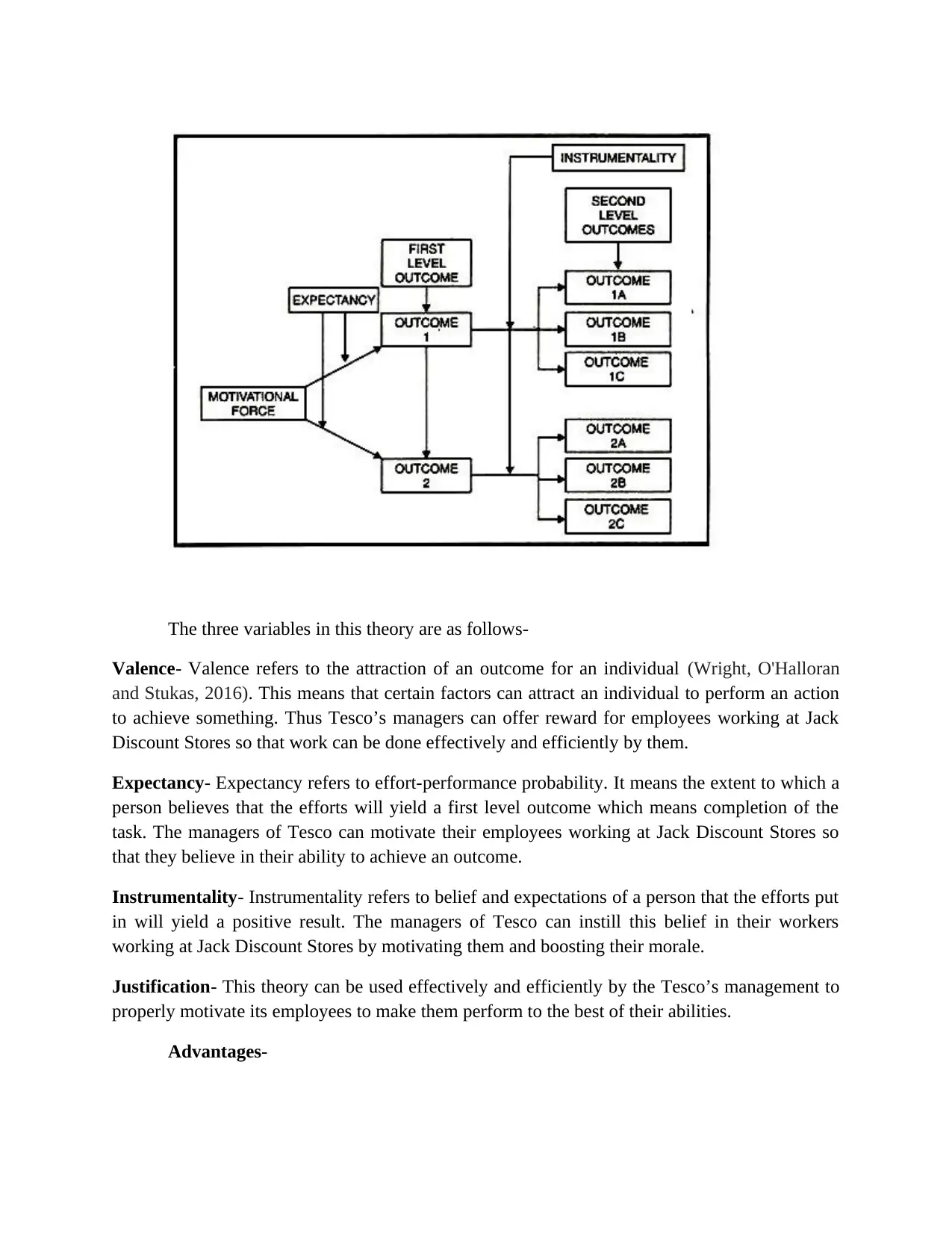
The three variables in this theory are as follows-
Valence- Valence refers to the attraction of an outcome for an individual (Wright, O'Halloran
and Stukas, 2016). This means that certain factors can attract an individual to perform an action
to achieve something. Thus Tesco’s managers can offer reward for employees working at Jack
Discount Stores so that work can be done effectively and efficiently by them.
Expectancy- Expectancy refers to effort-performance probability. It means the extent to which a
person believes that the efforts will yield a first level outcome which means completion of the
task. The managers of Tesco can motivate their employees working at Jack Discount Stores so
that they believe in their ability to achieve an outcome.
Instrumentality- Instrumentality refers to belief and expectations of a person that the efforts put
in will yield a positive result. The managers of Tesco can instill this belief in their workers
working at Jack Discount Stores by motivating them and boosting their morale.
Justification- This theory can be used effectively and efficiently by the Tesco’s management to
properly motivate its employees to make them perform to the best of their abilities.
Advantages-
Valence- Valence refers to the attraction of an outcome for an individual (Wright, O'Halloran
and Stukas, 2016). This means that certain factors can attract an individual to perform an action
to achieve something. Thus Tesco’s managers can offer reward for employees working at Jack
Discount Stores so that work can be done effectively and efficiently by them.
Expectancy- Expectancy refers to effort-performance probability. It means the extent to which a
person believes that the efforts will yield a first level outcome which means completion of the
task. The managers of Tesco can motivate their employees working at Jack Discount Stores so
that they believe in their ability to achieve an outcome.
Instrumentality- Instrumentality refers to belief and expectations of a person that the efforts put
in will yield a positive result. The managers of Tesco can instill this belief in their workers
working at Jack Discount Stores by motivating them and boosting their morale.
Justification- This theory can be used effectively and efficiently by the Tesco’s management to
properly motivate its employees to make them perform to the best of their abilities.
Advantages-
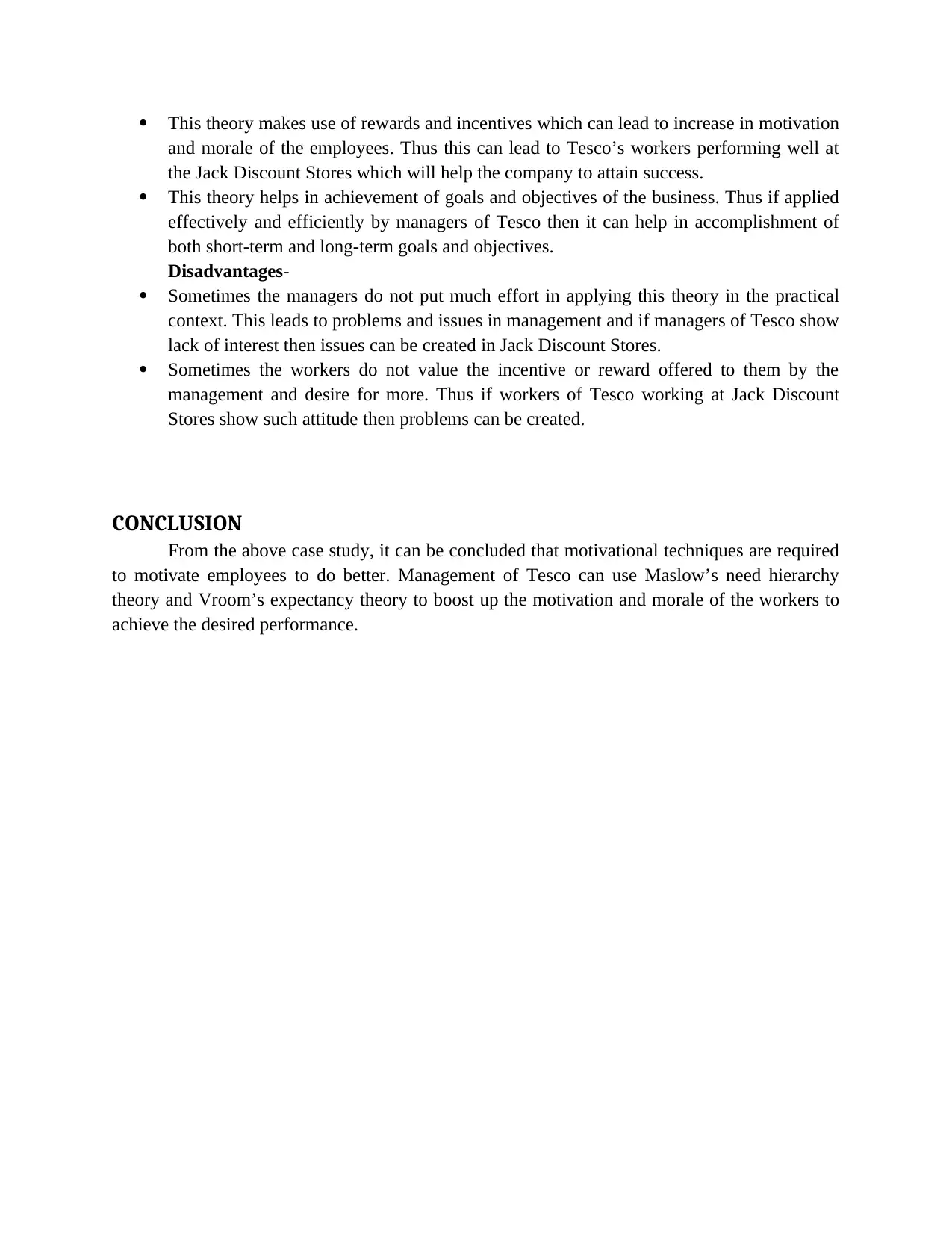
This theory makes use of rewards and incentives which can lead to increase in motivation
and morale of the employees. Thus this can lead to Tesco’s workers performing well at
the Jack Discount Stores which will help the company to attain success.
This theory helps in achievement of goals and objectives of the business. Thus if applied
effectively and efficiently by managers of Tesco then it can help in accomplishment of
both short-term and long-term goals and objectives.
Disadvantages-
Sometimes the managers do not put much effort in applying this theory in the practical
context. This leads to problems and issues in management and if managers of Tesco show
lack of interest then issues can be created in Jack Discount Stores.
Sometimes the workers do not value the incentive or reward offered to them by the
management and desire for more. Thus if workers of Tesco working at Jack Discount
Stores show such attitude then problems can be created.
CONCLUSION
From the above case study, it can be concluded that motivational techniques are required
to motivate employees to do better. Management of Tesco can use Maslow’s need hierarchy
theory and Vroom’s expectancy theory to boost up the motivation and morale of the workers to
achieve the desired performance.
and morale of the employees. Thus this can lead to Tesco’s workers performing well at
the Jack Discount Stores which will help the company to attain success.
This theory helps in achievement of goals and objectives of the business. Thus if applied
effectively and efficiently by managers of Tesco then it can help in accomplishment of
both short-term and long-term goals and objectives.
Disadvantages-
Sometimes the managers do not put much effort in applying this theory in the practical
context. This leads to problems and issues in management and if managers of Tesco show
lack of interest then issues can be created in Jack Discount Stores.
Sometimes the workers do not value the incentive or reward offered to them by the
management and desire for more. Thus if workers of Tesco working at Jack Discount
Stores show such attitude then problems can be created.
CONCLUSION
From the above case study, it can be concluded that motivational techniques are required
to motivate employees to do better. Management of Tesco can use Maslow’s need hierarchy
theory and Vroom’s expectancy theory to boost up the motivation and morale of the workers to
achieve the desired performance.
⊘ This is a preview!⊘
Do you want full access?
Subscribe today to unlock all pages.

Trusted by 1+ million students worldwide
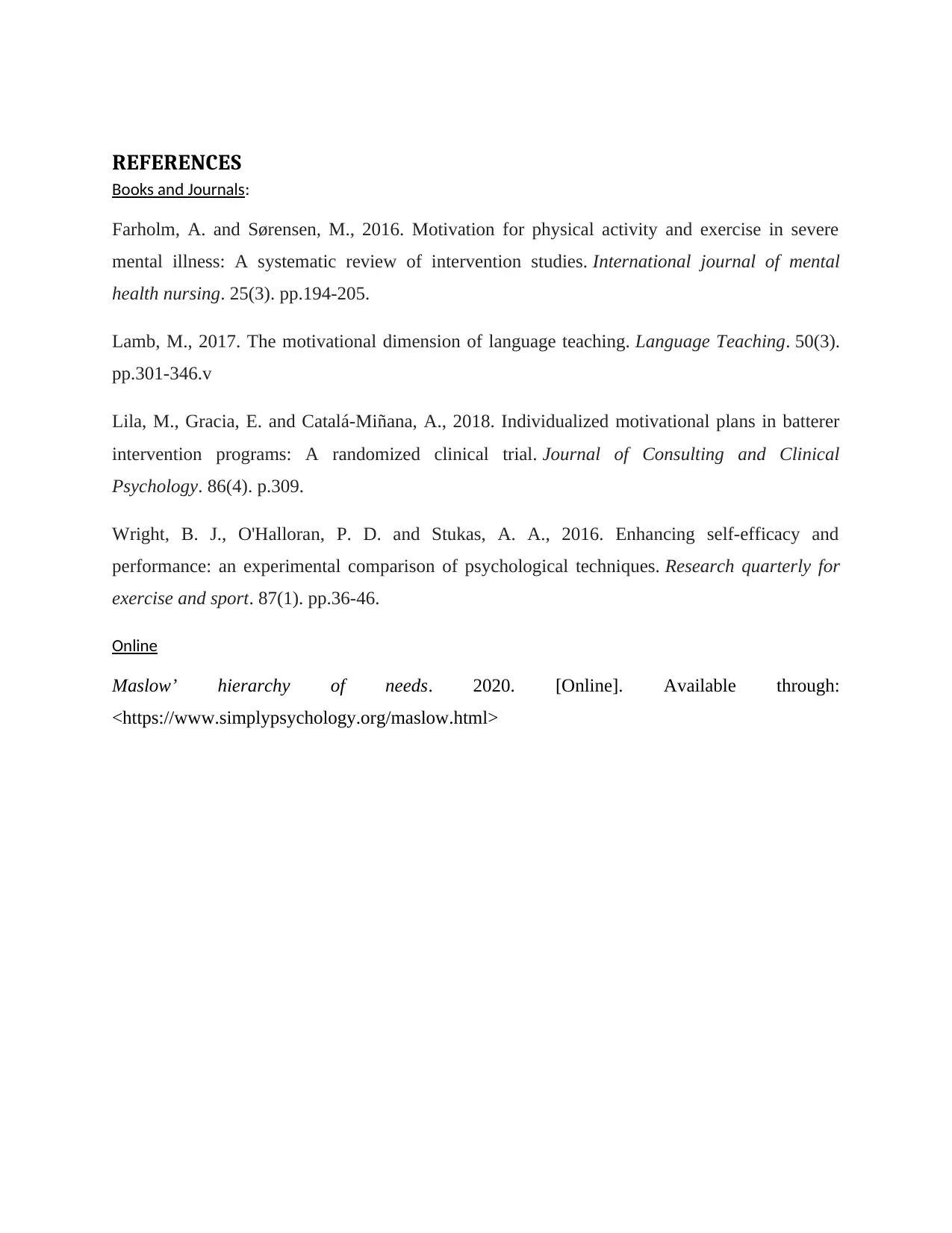
REFERENCES
Books and Journals:
Farholm, A. and Sørensen, M., 2016. Motivation for physical activity and exercise in severe
mental illness: A systematic review of intervention studies. International journal of mental
health nursing. 25(3). pp.194-205.
Lamb, M., 2017. The motivational dimension of language teaching. Language Teaching. 50(3).
pp.301-346.v
Lila, M., Gracia, E. and Catalá-Miñana, A., 2018. Individualized motivational plans in batterer
intervention programs: A randomized clinical trial. Journal of Consulting and Clinical
Psychology. 86(4). p.309.
Wright, B. J., O'Halloran, P. D. and Stukas, A. A., 2016. Enhancing self-efficacy and
performance: an experimental comparison of psychological techniques. Research quarterly for
exercise and sport. 87(1). pp.36-46.
Online
Maslow’ hierarchy of needs. 2020. [Online]. Available through:
<https://www.simplypsychology.org/maslow.html>
Books and Journals:
Farholm, A. and Sørensen, M., 2016. Motivation for physical activity and exercise in severe
mental illness: A systematic review of intervention studies. International journal of mental
health nursing. 25(3). pp.194-205.
Lamb, M., 2017. The motivational dimension of language teaching. Language Teaching. 50(3).
pp.301-346.v
Lila, M., Gracia, E. and Catalá-Miñana, A., 2018. Individualized motivational plans in batterer
intervention programs: A randomized clinical trial. Journal of Consulting and Clinical
Psychology. 86(4). p.309.
Wright, B. J., O'Halloran, P. D. and Stukas, A. A., 2016. Enhancing self-efficacy and
performance: an experimental comparison of psychological techniques. Research quarterly for
exercise and sport. 87(1). pp.36-46.
Online
Maslow’ hierarchy of needs. 2020. [Online]. Available through:
<https://www.simplypsychology.org/maslow.html>
1 out of 7
Related Documents
Your All-in-One AI-Powered Toolkit for Academic Success.
+13062052269
info@desklib.com
Available 24*7 on WhatsApp / Email
![[object Object]](/_next/static/media/star-bottom.7253800d.svg)
Unlock your academic potential
Copyright © 2020–2025 A2Z Services. All Rights Reserved. Developed and managed by ZUCOL.





